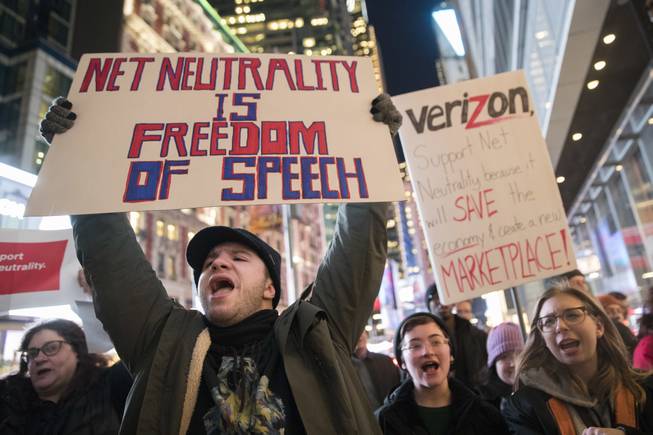
Mary Altaffer / AP
In this Thursday, Dec. 7, 2017, file photo, demonstrators rally in support of net neutrality outside a Verizon store in New York.
Monday, Jan. 8, 2018 | 2 a.m.
The battle against misinformation
State attorneys general from California, the District of Columbia, Delaware, Hawaii, Iowa, Illinois, Kentucky, Massachusetts, Maryland, Maine, Mississippi, North Carolina, Pennsylvania, Rhode Island, Virginia, Vermont and Washington have petitioned the FCC to cooperate with New York’s Eric Schneiderman to investigate fake comments about net neutrality made under stolen identities. According to the Pew Research Center, more than half of the 21.7 million public comments were faked.
A principle, not a law
Net neutrality rules were about regulating access to the internet. Net neutrality itself wasn’t a law, but a principle that was protected by the Obama-era rules, just like freedom of speech is a concept protected and supported by our laws and Constitution.
Join the conversation by using these hashtags
#netneutrality
#savetheinternet
#savenetneutrality
#goFCCyourself
In 2015, the Federal Communications Commission passed rules regarding open internet neutrality regulation for wired and wireless internet connections. On the internet, information is made of packets that travel from point A to point B through internet service providers (ISPs). A neutral or open internet means ISPs aren’t able to discriminate against or control those packets based on the technology used for transit, the point of origin or the destination, or the type of content being transmitted. The regulations drew ire and numerous petitions, challenges, and hearings from corporate carriers and other telecom organizations. But with the election of President Donald Trump, the tables turned and, in a 3-2 (R-D) party-line vote Dec. 14, the FCC repealed the Obama-era rules.
• Increased costs: You may pay more for access to “channels” of the internet, much as you do for cable television. For example, service providers could charge and additional $5 a month for what they deem “elite packages,” which might include social media sites and streaming services. So in addition to paying to connect to the internet, you may also have to pay for access to specific content. This doesn’t include subscription fees that come with services such as Netflix and Hulu.
• Limited access to information: The internet provides immediate access to an endless range of free information, including high-quality videos, news, music, etc. More expensive or slower connection to those resources would limit what information schools in poorer communities could access.
• Censorship: ISPs could censor or slow down content they don’t agree with or content from competitors. For example, Verizon may only allow you to access Yahoo Mail (owned by Verizon), Gmail, or other large email providers, as opposed to smaller email services.
• Equal access: An open internet means equal access to information. In many communities, both city and rural, millions of people live without broadband access, much less the availability to afford a basic connection. Public libraries provide a crucial source of internet for many American citizens, a necessary resource in a modern world.
• Democratic principles: Tony Marx, president of the New York Public Library, noted in an interview with The Verge that if you “curtail people’s access to information, not only will they not be able to do their homework or look for a job or use our collections, they will not be able to inform themselves as citizens.” He continued: “Anything that reduces that, particularly for people who can’t afford alternatives, is a body blow to the basic democratic principles that the library stands for.”
• • •
Arguments for net neutrality
Past the point of no return?
In November, New York Times columnist Farhad Manjoo wrote that the creative, competitive internet is dying. “The five most valuable American companies — Amazon, Apple, Facebook, Google and Microsoft — control much of the online infrastructure, from app stores to operating systems to cloud storage to nearly all of the online ad business,” he wrote. Additionally, he noted, broadband companies such as AT&T, Charter, Comcast and Verizon provide virtually all the internet connections for private American consumers, and are likewise angling to create their own content. Soon, the net we have built may be so unrecognizable from its original concept that there is no such thing as “neutrality” anyway.
• Everyone should be capable of sharing or consuming an idea/product/service via the internet.
• The end of open internet widens the digital divide, restricting people’s access to information if they can’t afford it, and contributes to inequality of education and opportunity.
• All data should be able to be sent and received at the same rate. Data from small businesses should be treated the same as data from Amazon.
• It prevents corporate censorship. Regulations protecting net neutrality would inhibit ISPs from throttling or blocking websites they consider unacceptable.
• Without net neutrality, ISPs will be able to block content, slow streaming services from company rivals, and offer “fast lane” pricing for preferred partners.
• As more than 200 of them stated in a letter to FCC Chairman Ajit Pai, start-up companies, which can’t afford “fast lane” access, would suffer, curbing innovation outside of corporate entities.
• • •
Arguments against net neutrality
• Internet service companies like AT&T, Spectrum (Time Warner Cable) Comcast Xfinity and Verizon oppose net neutrality regulations, calling them just another way for government to control business innovation and growth.
• A “level playing field” doesn’t inspire competition or encourage investment. Consumers are willing to pay more for exclusive variety. New products and services from ISPs, corporations and other businesses are stymied by regulation.
• Consumers should be able to choose what products and services are successful.
• We already have anti-trust laws in place to ensure that consumers have choice.
